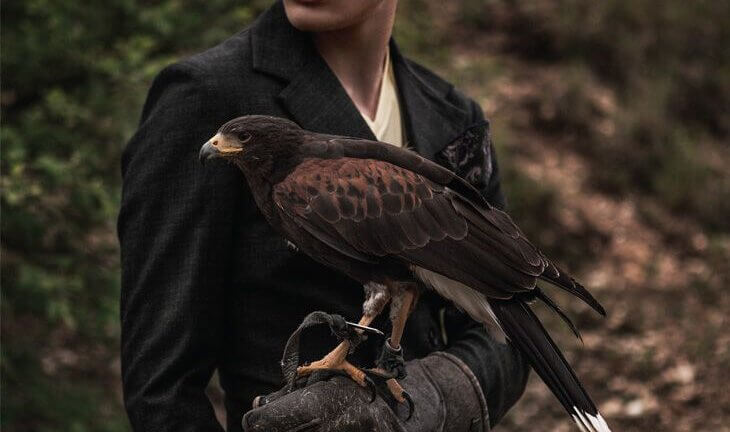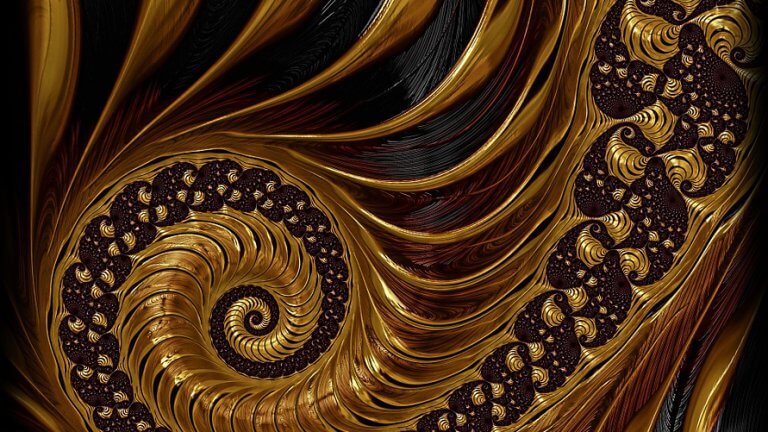
Gredin moved in a bubble of ease.
Figg accompanied her, and Gredin found that their progress down the corridor felt more like floating than walking. Her body existed in a state of balanced neutrality, neither too hot nor too cold, free of both pain and pleasure, replete with energy without feeling restless or constrained.
She had awakened in this state, aware of a calm inner sense of well being which she had assumed to be the aftermath of her night-thought, as if the Power’s steadying hand still rested lightly atop her head. She had been grateful for it, as she rose to start her day.
But the sensation hadn’t faded. Even now, walking with Figg, she felt cushioned, as if a thin protective layer existed between her skin and the air. It wasn’t numbness; she was acutely aware of everything around her, from the subtle circulation from the vents to the reassuring weight of the pouch in her pocket. But each contact from outside of herself, whether physical or emotional, felt…buffered. Filtered. Unthreatening.
Two days ago, she had walked Tradepoint’s corridors with eagerness and avid curiosity. Yesterday, she had traversed them in an anguished daze. Today, she was able to watch with steady interest as the metal corridor unfurled before her like a ribbon of silver.
“Gredin? Are you all right?”
“Yes, Figg, I am quite well.”
They continued for ten steps along the corridor before Figg spoke again. “I was concerned about you, yesterday.”
“You were right to be. I felt as if I had lost control of my mind, and I’m sure others thought so, as well. I used all of the restraint I had, but it wasn’t nearly enough.”
“You seem very different, today.”
Gredin counted off ten more steps while she considered how best to respond. “Our situation is no less terrible now than it was yesterday,” she began, “and no less true. The only thing that has changed is me – and it is not a change I created.”
Figg appeared to ponder that statement. “The Power,” she said then, her voice expressionless.
“Yes. Is that so difficult for you to believe?”
“Yes. Your pardon, but yes. I am a—” And she used an unfamiliar Prettian term.
Gredin shook her head. “I do not know that word.”
Figg offered her a crooked smile. “Isn’t that always the way? It is the words we most need that stubbornly elude us. No matter. I mean only to convey that we Prett are a people intent on understanding why things happen as they do. We make a study of all that surrounds us. We do not easily rely on anything we cannot understand. We Prett make things. We made Tradepoint itself. We made the thing that can see the break in the bones in the Hesch’s foot. The Prett people have studied to learn how to make many, many things, and how to understand many, many more that are brought here by traders from other worlds.”
Gredin nodded her understanding.
“We do not, however, understand the things that Vennans can do,” Figg confessed. “We do not understand how you come here to Tradepoint without a ship. Wyve and I do not understand what Burlon did yesterday, this moving from one place to another in an instant. We saw it happen, but we do not understand how it is done, and so it makes us uneasy. And least of all do we understand when you speak to us of these dreams that you have had, these dreams from ‘the Power.’ I mean no disrespect, but what are we to make of a communication source that can reach you here without registering on any of our equipment, and without enlightening anyone else in the Vennan enclave?”
“The Power intended to speak only to me, and so of course no one else in the enclave heard. Beyond that, although your doubts do not distress me,” Gredin said, “I have no answers for you. The night-thoughts are not something I have done. They are something that has happened to me. Nothing like them ever happened to me before I came here, and such a thing may never happen to me again. I have heard no tales of any of our people experiencing such a night-thought. I do not know why I was chosen to receive the Power’s touch. I suspect, when I speak to the delegation tomorrow morning, that many will react as Tetralanna has, disbelieving my words. There will be tears and doubt. Confusion. Fear. Even anger. Some may doubt me because I am young. But Keegan will stand by me, and perhaps Burlon, and that will help. It is vital that I convince the delegation that my words are true. ”
“Why?”
“They must understand that our return to Venna is not a choice, nor is it a topic open for debate. Cirin has already gone, and not yet returned. We cannot let anyone else attempt to journey to a place that no longer exists. It is not safe, and we who are left are few.” She sighed. “I am sorry, Figg. I know that we present you and Wyve with an immense difficulty. But we had no notion when we came that –” Gredin hesitated. She wanted to say that such a fate would befall us. Instead, her incomplete mastery of Prettian forced her to turn that weighty phrase into simply “—that such a thing would happen.”
Figg nodded, acknowledging her apology and explanation. “Wyve and I would like to learn more about this thing you call the Power.”
Gredin hesitated. “When there is time, I will gladly try and explain…but I fear, since you are not Vennan, that my words will prove less than helpful. It would be like you trying to explain to me how your griimoniwork.” She looked around. “The corridors seem very empty.”
Figg shrugged. “Few races are about, at this hour – too early for some, too late for most others. I didn’t ask to have the corridors cleared, if that’s what you want to know.” The corner of her mouth quirked upward. “There is no need to do so. No trader with any sense would interfere with me. We’ll likely find people doing business at the Market, when we get there.”
“There were people everywhere at the Market, yesterday, or so it seemed to me. What is the race with the beautiful baskets and the purple skin?”
“Purple skin? Those are the Polpethtira…although I have never known them to sell baskets.”
“No, I do not think the baskets were for sale. They appeared to be used for the display of goods. But they were beautiful. Will the Polpethtira be at the reception, tonight?”
“I’m not sure. I’m unaware of any request from them, but it’s possible that they dealt with Wyve.”
“Who else will be there? Someone besides the Hesch and the Beng, I trust.”
“Indeed, several more. The Mamora will be sending a representative. We’ve also had a confirmation from the Shodekekeen, which should please you.”
“It does.”
“And I believe a trio of Thalken have registered.”
“I have heard Burlon speak of the Thalken,” Gredin said, “but I know nothing about them. Are they the ones with the white hair?”
“No, those are the F’lala, who are not planning to attend, to our relief. Thalken are small and thin and hairless. Smaller than the Beng. Quite artistic, but overly prone to find fault with the behavior of others.”
Listening to Figg’s casual descriptions, Gredin supposed that living among a variety of races was one more odd aspect of Tradepoint to which she would need to become accustomed. It hammered home the realization that she was stranded, far from the life she had known, surrounded by a vast array of people who shared neither her experiences nor her beliefs. It made her long for the Vennan enclave and the sight of a familiar face – even Tetralanna’s. But there were other matters that she needed to handle, first. “Is it far from here, the Traders’ Market?”
“It is around one more turn of the corridor. Not far,” Figg said. “Are you tired? Do you need to rest? I could send for—” An unknown word.
Gredin shook her head. “I am not tired. I am eager to see the Shodekekeen merchant so that I can thank him. Do you think he will be there?”
“Quite likely. The Shodekekeen trade regularly here, so much so that they leave their maartza and warehouse space filled with goods even when they do not have a ship at dock.”
“Is that unusual?”
“No. Many of the races do so.”
“But not all?”
“No. Among the races you have either encountered or heard us discuss, consider the Hesch, the Thalken, the Rodorno, and the Mamora – for those four, when their ships leave, so do any goods they have bought and any of their own that are still unsold. But Shodekekeen, Wilra, Polpethtira, Beng, and F’lala often leave goods behind, with detailed instruction regarding acceptable sale parameters, in case someone inquires about a possible purchase. Wyve and I are experienced at conducting trading sessions on another race’s behalf, should they desire us to do so, to prevent the loss of a deal and its subsequent profit.”
“That is kind of you.”
Figg laughed. “No, not kind. Part of the profit from every trade belongs to Tradepoint, always, and an even greater percentage comes to us when we act as brokers on a deal. Sometimes, the Kikaradd choose this course. And sometimes the Anamandasit do, as well. Once in a while, even the— Ah! We are here.”
Looking ahead, Gredin saw that they had indeed arrived at the scene of yesterday’s debacle – the tall, metal doors, and the panel of lights. Figg produced a brightly polished rectangle of metal, and pressed it against the panel, instead of using her hand, as Ellis te Vell had done the day before.
The previous day, Ellis’s touch had caused a single light in the array to shift from blue to orange. Today, colors rippled from the top of the panel to its bottom, then remained steady, a bright rainbow of color.
“This alerts security personnel – and anyone else paying attention – that I am entering the Market,” Figg said in explanation, and re-pocketed the metal rectangle.
The doors slid open.
The noise level within the Market dipped abruptly as they entered, not to total silence but to a noticeable if momentary hush. But when Figg made no announcement, the general hubbub largely resumed. Glances slid toward them and away; Figg paid no attention, walking serenely through the crowd as if the marketplace were empty.
In a surprisingly short time, a familiar maartza came into view. Figg drew Gredin to a stop, a few steps short of it. “I will determine whether the Shodekekeen currently has a customer. Wait here,” she said, and approached more closely, alone.
A few moments later, however, Figg beckoned Gredin forward, and they entered together.
A blue-furred Shodekekeen roused from the back recesses of the maartza and began to shamble forward on its six stout legs. Gredin waited, unable to determine at a glance whether it was the same Shodekekeen with whom she and Keegan had dealt.
“What seek?” it asked in accented Tradetalk as it approached, then reared up suddenly on its hind legs in apparent surprise. “’Sistant ’Rector,” it acknowledged, dipping its head in Figg’s general direction. “Bad come? Good come?”
“Good come,” Figg said firmly. “I bring friend.”
Gredin crossed her palms to the Shodekekeen. “I come thank Shodekekeen red cloth.”
The Shodekekeen tilted its head this way and that, its gaze fixed on her. Then, making a soft crooning sound, it dropped down onto all six feet and came up to her. “Who?” it demanded, leaning so close that its broad, moist nose nearly touched the fabric of her gown. “Who this make?”
“Vennan friend,” Gredin replied, reluctant to introduce Ingarra’s name into the conversation.
The Shodekekeen raised a meaty paw. One long, curved claw sprang free, which it used to indicate the line of tiny, red-on-red embroidered flowers that now adorned the hem. “Vennan friend do this?”
“Yes.” It was the sort of adornment that Ingarra loved, each blossom so subtle and delicate that the embroidery might well have gone unnoticed by a less appreciative eye. But it had not escaped the Shodekekeen’s attention.
The paw gestured, its meaning clear, and Gredin turned slowly in place, letting the trader view the sides and back of the gown, as well as the front.
“Yes,” it said. “Yes, yes, yes. Tell friend good. Much good.”
“Beautiful cloth,” Gredin replied. “I thank Shodekekeen much and much.”
The Shodekekeen shook its head, and the thick blue fur rippled and settled back into place. “Here is cloth,” it said, gesturing to the right. “Here is cloth.” Its paw swept left. “Here is much, much cloth,” it continued, indicating the rest of the maartza. Then it sat back on its haunches, freeing both of its front paws to gesture at Gredin. “Here is good. Here is beautiful.”
“I thank. Yes, I tell friend Shodekeen say good.”
They remained as they were for several moments, gazing at one another in the wake of their mutual exchange of good wishes. Gredin observed the Shodekekeen’s pale muzzle and dark, wrinkled forehead, looking for visual signs to correlate with its approving words. The shape of its head, the placement of its small eyes, the pattern of light and dark fur, the slope-shouldered silhouette of its powerful body were so different from anything Vennan that it was difficult for her to interpret the nuances that might indicate a subtle change in the Shodekekeen’s mood. She knew that it was pleased now, just as she had known that it was angry, at the Judgment in Wyve’s office, when it snarled at the Beng. But there were bound to be a range of expressions between those two extremes, and she wanted to begin to learn them.
Figg said quietly, “We go now, Gredin?”
The Shodekekeen’s forehead wrinkled further. Indicating her with a slight elevation of one front paw, it said thickly, “Grrdin?”
Placing her hand on her chest, Gredin said, “Yes. Gredin. Gredin te Balamont, I. Gredin.”
“Grrdin,” it repeated.
She nodded.
A single long claw traced a line through the thick medallion of paler fur at the base of the Shodekekeen’s throat. “Shamka.”
“Shamka,” she said, imitating the slightly elongated buzz of the ‘m’ as best she could.
It bobbed its head. “Yes. Shamka. Shamkalak Urmo Memelo, I. Shamka.”
Gredin crossed her palms. “Shamka. I thank. I go.”
“Grrdin.” A dip of the massive head. “’Sistant ’Rector.” Shamka dropped down and began to turn away, then swung back. “Other time,” it said, “I show Grrdin colors.”
Confused, Gredin opened her mouth to ask for a clarification.
But Figg said, “Yes. Good. We thank you,” and gestured for Gredin to precede her out of the maartza.
“Good day, Shamka,” Gredin said with mild regret to the Shodekekeen, and crossed her palms to it. “I see you other time, new time, soon.”
“Yes. Other day, Grrdin,” Shamka replied, with an answering bob of the head.
With that, Figg and Gredin left the Shodekekeen maartza.
“Come,” Figg said, and began to walk.
Gredin followed, but her thoughts lingered with the blue-furred cloth trader. “Do you know Shamka?” she asked Figg.
“No. I have had little direct contact with the Shodekekeen. They more often deal with Wyve, and even that is rare, for they are largely a quiet, peaceable people. We deal far more often with those who find the rules of Tradepoint…constricting.”
Like the Beng, Gredin thought.
As if her thought had conjured them, a band of Beng came into view in the aisle ahead of them, coming their way. “Calmly,” Figg murmured.
But Gredin found that she wascalm. “I cannot tell one from another,” she admitted. “I suppose they count on that.”
“As a rule, yes,” Figg conceded. “In this instance, however, their identities matter not. Wyve’s judgment applies to all Beng on Tradepoint.” They were nearly abreast of the group of Beng now, and Figg addressed them directly. “Good day.”
They retreated a hasty step, jostling one another, looking up at Figg with an air of trepidation. “Assistant Director,” one of them said, and another added belatedly, “Good day.”
Figg pointed at Gredin. “Beng look. See good. Gredin te Balamont, this. Vennan. All Beng know this name, yes?”
Sidelong glances, dour expressions, and finally a few reluctant nods.
“Good,” Figg said. “Then Beng understand why Beng must go. Leave Market now.”
Three of the Beng opened their mouths, and one at the back of the group was bold enough to mutter, “Unfair.”
“Judgment,” Figg stated. “Beng obey Judgment. Go. Now. Unless maybe Beng want Judgment bigger.”
With hunched shoulders, they shuffled past, their resentment of Wyve’s verdict apparent. Figg pivoted where she stood, making it clear to all that she was watching them until they passed from sight. Signaling to a Prett security guard on patrol, she said, “Follow after the Beng. No need to be subtle. Make sure they leave, and notify me once they have cleared the doors.”
“Yes, Assistant Director.”
“My thanks,” Figg said, and walked on.
Keeping pace with her, Gredin asked, “Was that necessary? The Market is large. The Beng could simply have kept their distance.”
“The Market has many aisles and cross-aisles. I prefer to proceed without needing to glance over my shoulder. A slight delay in their errand will do the Beng no harm. The Judgment only covers four shifts. You will have plenty of other opportunities to smooth matters between yourself and the Beng, now that you are staying. For the moment, let us concentrate on leaving the Market peaceably.” Striding briskly along the wide aisle, Figg said, “I hope you are not too hungry and can wait until you are back in your enclave to eat. I cannot offer you a meal here without endangering your health.”
“Do the traders eat nothing from the Market?” Gredin asked on a note of surprise, then answered her own question. “No, that cannot be right, for Balamont’s traders have brought many things from Tradepoint to Venna that are delicious.”
“True,” Figg conceded reluctantly. “But I don’t know how they tell what is safe for Vennans to eat and what is not. I do not plan to take any chances with your safety by exposing you to unfamiliar food items. Wyve and I need you in good health for the Trisectoriana, if we are to successfully manage this matter of Burlon acting for Cirin.”
Nothing in Figg’s words was particularly comforting. Growing up within House Balamont, Gredin had never needed to worry about people like the Beng harboring ill will toward her, or about what she ate. Everyone around her had been a kinsman, and anything presented at table had been safe and tasty. Here, once she stepped beyond the protective walls of the Vennan enclave, every encounter carried the potential for enmity, and every unfamiliar morsel and sip could prove dangerous…
Gredin sat across from Dreff on the grass of the Common Gardens as he carefully peeled the bright yellow rauno. “Take a bite,” he instructed when he was done, and handed it to her.
Gredin looked warily from the coil of tough, lumpy peel at Dreff’s feet to the dripping inner fruit in his hand. But she was hungry after a morning of lessons on fetching with Ingarra and Beda, and so she accepted the slippery offering.
The rich aroma rising from the fruit made her mouth water before she had even taken the first bite. Encouraged, she tried a generous mouthful. A sweet, musky flavor exploded on her tongue, and juice dripped down her chin as she looked up at Dreff, astonished. “It’s delicious!”
Dreff’s delighted smile was huge. “Despite the mess it makes, rauno is my favorite fruit. I’m glad you like it, too. Just be careful when you get close to the pit. It can be quite rough against your tongue.”
Taking another juicy bite, Gredin marveled. “I can’t believe something this good was hiding beneath all those sharp, ugly bumps. I thought you must be trying to play a trick on me, when I first saw it. Who do you suppose first figured out how to eat one?”
“Someone braver than I,” Dreff said, laughing. “But you should know by now that I would never let any harm come to you…”
And now Dreff, who should have been with her forever, had returned to the Source. He was gone…and, in a way, she was gone, as well. At least, the Gredin he had known was no more. The Power had come to her, and spoken to her, and changed her. She was no longer the girl who needed Dreff’s steadying hand to remain steady herself. In the past, she had often asked herself what Dreff would do, or choose, or say. But she did not think she would be asking herself such questions anymore. She was simply Gredin now, alone but transformed, made ready for the difficult road down which she must lead the others.
Tomorrow morning, she would reveal the truth to all in the delegation: Venna is gone. It was their new reality, the one with which they must all come to terms.
Well, Vennan traders and travelers had long since learned how to survive their time on Tradepoint without major incident. And now, the Power willing, so would she.
So would they all.





